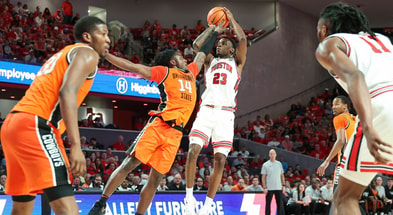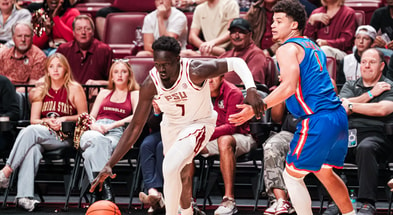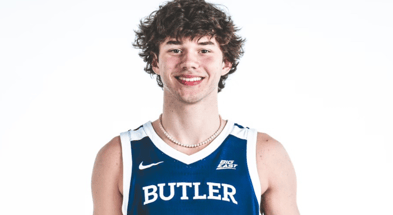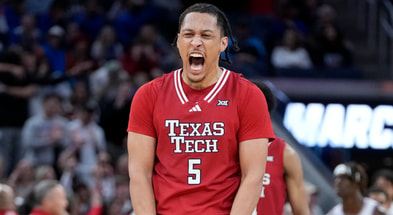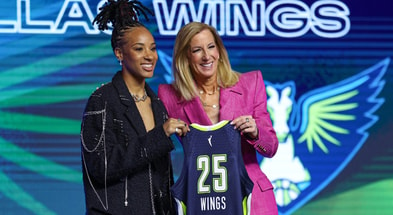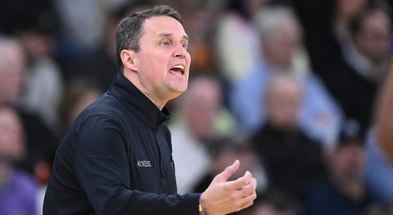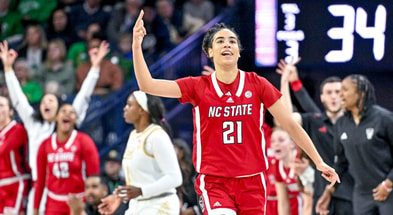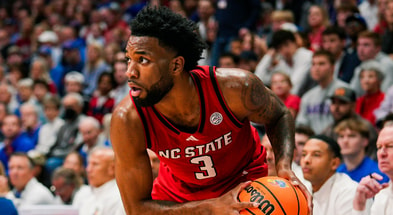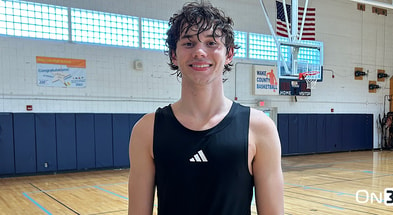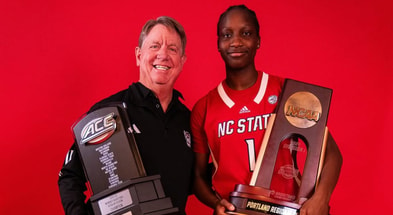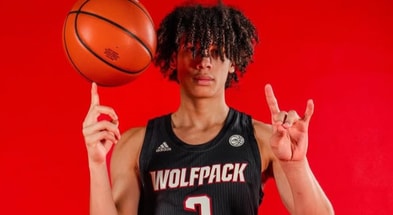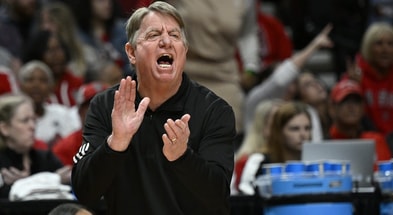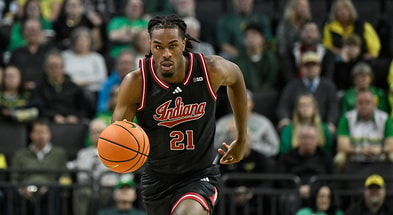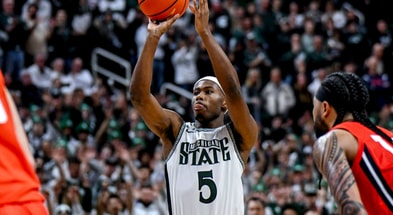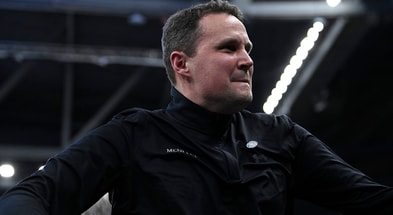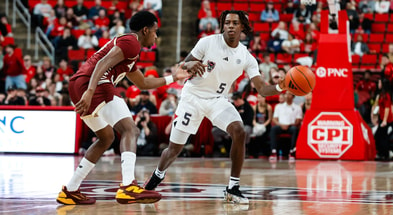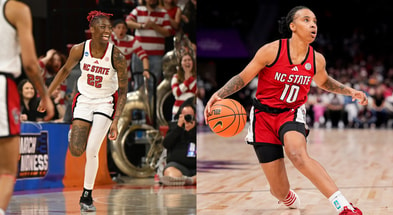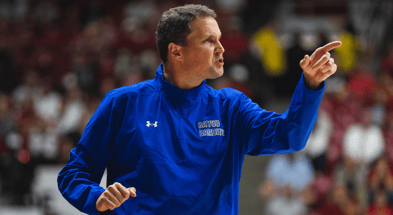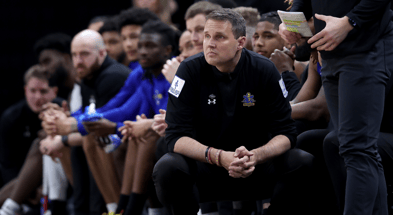Tim Peeler: How NC State men’s basketball coaches have fared in their first season with the Pack

New NC State men’s basketball coach Will Wade all but guaranteed a successful first season in 2025-26 during his introductory press conference at Reynolds Coliseum on Tuesday, a vote of self-confidence that rallied those in attendance.
“I want to be very clear,” Wade said. “This is not a rebuild. We’re going to be in the top part of the [Atlantic Coast Conference] next year and we’re going to the NCAA tournament.
“Make sure you have that on camera. This is going to be done quickly. We are here to win.”
If he comes through on that promise, he will continue a string of first-year successes that began with Everett Case in 1946-47 and has carried forward by other head coaches in succession.
That, of course, depends on the definition of success, which is vastly different from the days just after World War II until today’s new world order for college basketball.
Winning the conference regular-season championship right away? Everett Case did that.
Winning the conference tournament the first season? Case and Press Maravich both did that.
Making it to the conference title game the first season? Case, Maravich, Herb Sendek and Sidney Lowe all did that.
Making it to the NCAA tournament in the first season? Maravich, Les Robinson, Mark Gottfried and Kevin Keatts all did that. Gottfried was the most successful, advancing to the Sweet Sixteen.
Following is a look at how each coach since Case has fared in his first season of guiding the Wolfpack.
NC State First-Year Coaches
Everett Case, 1946-47, 26-5 overall, 11-2 Southern Conference, regular-season and tournament champions, lost in second round of the National Invitation Tournament to Kentucky, 60-42
To be clear, the expectations for this season were lower than the bottom of the swimming pool in the basement of Thompson Gymnasium. The previous year, led by a part-time coach who was a full-time member of the North Carolina Highway Commission, the Red Terrors won only six games and tied for ninth in the 16-team Southern Conference. The athletics department changed its entire roster of war-time coaches and hired, full-time, an Indiana high school coach named Everett Case to take over the basketball program, as well as new coaches for baseball and swimming. Case retained only one player from the previous team, Leo Katkaveck, and brought in a handful of “Hoosier Hotshots” from Indiana, including future head coach Norman Sloan, to fill out his roster. They were primarily players Case had coached at Frankfort High School prior to the war or players, like three-time All-American and four-time All-Southern selection Dick Dickey, Case had faced as the coach of a Navy all-star team during the war. No one paid much attention to what the future Hall of Fame coach and his team did until a six-game post-Christmas road trip that was highlighted by a win over eventual 1947 national champion Holy Cross. The Terrors returned home to standing-room-only crowds and even had its senior-day game against North Carolina canceled because too many students, faculty and local fans showed up to see the game at the crumbling on-campus gym that the team had suddenly outgrown. The Terrors entered Southern Conference play at 9-2, won 11 of 13 league games, won the first of six consecutive SoCon championships and was invited to play in its first postseason championship event, the National Invitation Tournament, in what is likely the greatest start to a coaching career in any Wolfpack sport.
Press Maravich, 1964-65, 21-5 overall, 10-4 ACC, tied for second in regular-season, ACC tournament champions, lost in first round of NCAA East Region to Princeton
Maravich, the former head coach at Clemson, was Case’s hand-picked successor who had joined the program in 1962 as an assistant. He was scheduled to become head coach for the 1965-66 season, after Case was forced to take mandatory retirement by the state of North Carolina and when his son, Broughton High School All-American “Pistol” Pete Maravich would enroll at NC State. However, Case’s failing health forced him to retire two games into the 1964-65 season, after an 86-80 loss at Wake Forest, and Maravich took over the team nearly a full season ahead of schedule. The Pack wasn’t exactly loaded that season, with no single standout player. Pete Coker and Larry Lakins, however, were good inside building blocks and sophomore Eddie Biedenbach was a future All-ACC player. Guards Billy Moffitt and Tommy Mattocks rounded out a starting lineup that managed 11 straight wins after Maravich took over for Case. The Pack finished tied for second in the ACC, but were well behind Top 10 Duke heading into the ACC Tournament. Still, Maravich and his squad, led by reserve Larry Worsley, pulled off three consecutive wins, including an upset of the No. 8 Blue Devils in the title game at Reynolds Coliseum to win the school’s fifth ACC title in 12 years. Maravich was the first first-year coach to win an ACC title. North Carolina’s Bill Guthridge is the only other coach to match that feat, which he did in 1998. Maravich took the Pack back to the ACC title game in 1966, where it lost to Duke. Pete never got his mandatory qualifying scores to enroll at NC State or any other ACC school and both father and son took off for LSU after the season.
Norman Sloan, 1966-67, 7-19 overall, 2-12 ACC, eliminated in first round of ACC tournament, no postseason tournament
A former player under Case, Sloan was a natural to succeed Maravich. In his first 15 years as a head coach, Sloan had turned Presbyterian College, the Citadel and Florida into successful programs and seemed primed to step up to the big time. The Wolfpack, however, was not. After losing Mattocks, Coker, Worsley and Moffitt from the 1965-66 team, Sloan’s inaugural team suffered another blow when would-be senior Eddie Biedenbach had to have back surgery prior to the season and was forced to take a medical redshirt. The team lumbered along throughout the year, facing a brutal schedule that included trips to Loyola, Southern California, Utah (all losses) and home games against Tulane and Pitt (both wins). It lost to both South Carolina and Clemson in the North-South Doubleheader and exited the ACC tournament after an opening-round loss to North Carolina. Sloan did not inherit a deep roster, but did manage to add one player in his first recruiting class, Fayetteville’s Vann Williford, who took the scholarship that was being reserved for Maravich. Center Billy Kretzer, at 11.7 points a game, was the leader of four players who averaged double-digit scoring, but it was not a team that could compete with the likes of Duke, coached by former NC State player and assistant under Case, Vic Bubas, and North Carolina, which made the first of three consecutive trips to the NCAA Final Four. But the next season, when Biedenbach returned for this senior year and Williford was eligible to play, Sloan took his second team to the ACC title game, thanks to the infamous 12-10 semifinal win over Duke, in which Kretzer spent the majority of the game dribbling the ball at midcourt. By Williford’s senior year, the Wolfpack was fully integrated and loaded enough for Sloan to win the first of his three ACC titles. Williford was named Most Valuable Player of the 1970 tournament, in which the Pack upset heavily favored South Carolina in the title game.
Jim Valvano, 1980-81, 14-13 overall, 4-10 ACC, first-round loss to North Carolina in the ACC tournament, no postseason
Valvano, the brash New Yorker hired from Iona College, inherited a team that had lost Charles “Hawkeye” Whitney and Clyde Austin but was exceptionally tall with 7-5 junior Chuck Nevitt, 7-0 senior Craig Watts and 6-11 sophomore Thurl Bailey. Sophomore guards Sidney Lowe and Dereck Whittenburg had gained valuable playing time throughout their freshman campaign, when the Wolfpack finished second overall in the ACC, and were ready to step up as leaders as sophomores. Valvano thought his team was stocked well enough that he signed only one recruit in his first season, Harold Thompson of Raeford, North Carolina. Valvano’s inaugural team began with a bang, winning seven of his first nine games. Included in those victories were three of significance. First, Valvano won his first matchup against the ACC’s other new coach, Duke’s Mike Krzyzewski, in the consolation game of the Big Four Tournament in Greensboro. Then he took his team to New York’s Madison Square Garden for the ECAC Holiday, where the year before Valvano had led Iona to the championship by beating Louisville 77-60 in the title game, an outcome Valvano called the greatest thrill of his playing or coaching career. The Cardinals eventually won the 1980 NCAA title. Valvano and the Wolfpack faced Iona in the first game of the 1980 ECAC event, a bittersweet matchup for the new coach. After winning that game, 61-58, the Pack faced St. John’s and head coach Lou Carnesecca, one of Valvano’s heroes. It won that game, 64-55, to give Valvano his second consecutive title in the event, albeit with different teams. Valvano’s team struggled in ACC play, getting three of its four wins by sweeping Georgia Tech, which went winless in ACC play, and splitting two league games against Krzyzewski’s Blue Devils. The other conference win came in the season-finale, a 66-65 win over Wake Forest, which guaranteed a winning first season for Valvano. The year ended with a narrow loss to North Carolina in the first round of the ACC Tournament in Landover, Maryland.
Top 10
- 1Breaking
MiLaysia Fulwiley
South Carolina transfer to LSU
- 2Hot
2nd Round NFL Mock Draft
QBs under microscope
- 3
Shedeur Sanders reacts
To going undrafted in 1st round
- 4
Marcus Spears fires back
At Stephen A. Smith over Shedeur take
- 5
Picks by conference
SEC, Big Ten dominate NFL Draft
Get the On3 Top 10 to your inbox every morning
By clicking "Subscribe to Newsletter", I agree to On3's Privacy Notice, Terms, and use of my personal information described therein.
Les Robinson, 1990-91, 20-11 overall, 8-6 ACC, semifinal loss to Duke in ACC Tournament, second-round loss to Oklahoma State in NCAA Tournament
When Les Robinson returned to Reynolds Coliseum with his East Tennessee State Buccaneers on Dec. 19, 1989, Valvano knew he wasn’t likely to return the next season because of multiple investigations on allegations of wrongdoing within the Wolfpack program. Before the game, Valvano told Robinson that he would be the perfect candidate to take over the Wolfpack, for whom Robinson played under Case in the early 1960s. It was certainly a dream come true for the West Virginia native who got his start in coaching when Case stepped down two games into the 1964-65 season, by taking over the Wolfpack freshman squad. Robinson had plenty of talent to work with, as All-America guard Rodney Monroe and record-setting point guard Chris Corchiani were back for their senior season and junior forward Tom Gugliotta was poised for a breakout year. Monroe averaged 27 points during his senior campaign, smashing both the NC State and ACC career scoring records. Corchiani became the first player in NCAA history to collect more than 1,000 career assists. And Gugliotta averaged 15.2 points and 9.1 rebounds per game. All three earned first- or second-team All-ACC honors. Robinson’s Wolfpack also lost in a trip to East Tennessee, but the Pack beat Marquette and Robinson won his first meeting against both Dean Smith and Krzyzewski, beating UNC and Duke teams that both were ranked in the top 10. The Pack finished with a winning ACC record and advanced to the ACC championship semifinals, where it lost to Duke. However, Robinson never managed to get over the recruiting and academic restrictions from the NCAA probation he inherited from Valvano and stepped down after five consecutive losing seasons.
Herb Sendek, 1996-97, 17-15 regular season, 4-12 ACC, lost in ACC tournament finals to North Carolina, lost in second round of National Invitation Tournament
NC State athletic director Todd Turner was looking for new blood when he set out to replace Robinson, who resigned just after the Wolfpack lost in the quarterfinals of the ACC Tournament. Turner selected Sendek, a Rick Pitino protégé who compiled a 63-26 record in three seasons at Miami of Ohio, including a win over Arizona in the 1995 NCAA tournament. At 33, Sendek was the ACC’s youngest coach. The school had loosened almost all of the recruiting and academic restrictions that hampered Robinson and Sendek managed to put together a four-player recruiting class that included forwards Damon Thornton, Tim Wells and Andre McCullum along with guard Justin Gainey. Playing a rough-and-tumble defensive style necessitated by a thin roster, Sendek and his team began and ended strong during the season. It struggled during the ACC regular season being swept by North Carolina and Duke, but Sendek and his team did score a 60-59 overtime victory against No. 4-ranked Wake Forest, led by senior Tim Duncan, in Winston-Salem. That victory helped propel the Pack to a strong finish that included in three straight wins to end the regular season, three straight wins in the ACC tournament in Greensboro and a win against Southwest Missouri State in the NIT. The scrappy Pack, led by Gainey’s 160 minutes of play, surprised the ACC by advancing to the championship game, where it fought closely with No. 5 North Carolina before ultimately falling by 10 points. Still, Sendek returned the Pack, and a fanbase hungry for success, to postseason play for the first time in six seasons. It was an auspicious start to Sendek’s 10-year career with the Wolfpack.
Sidney Lowe, 2006-07, 20-16 overall, 5-11 ACC, lost in ACC tournament finals to North Carolina, lost in third round of NIT to West Virginia
After a prolonged coaching search that checked in with some of the biggest names in college basketball, athletics director Lee Fowler turned to one of his search advisors, legendary Wolfpack point guard Sidney Lowe, to take the job at his alma mater. Lowe had orchestrated the Wolfpack’s run to the 1983 NCAA title with fellow seniors Whittenburg and Bailey, then embarked on a long NBA playing, broadcasting and coaching career over the next two decades. At the time he was hired, Lowe was an assistant with the Detroit Pistons. Lowe matched Sendek’s record of winning his first five games of his inaugural season, including an 74-67 victory over Michigan at PNC Arena. Lowe thrilled the home fans by beating No. 3 ranked North Carolina in his first contest against the Tar Heels, but perhaps even more importantly he led his team to a 7-2 record against in-state teams during the regular season. In the opening round of the ACC tournament in Tampa, the Wolfpack downed another in-state team, upsetting No. 21 Duke 85-80 to kick off a run to the championship game. Lowe joined Case, Maravich and Sendek as a Wolfpack first-year coach to reach the title game of the league tournament in his inaugural season with the team. The Pack fell 89-80 to North Carolina in the finals, but had made a strong enough case to receive an invitation to the NIT, where it beat Drexel and Marist in the first two rounds. Lowe joined Robinson, Maravich and Case as first-year NC State coaches to win a minimum of 20 games.
Mark Gottfried, 2011-12, 24-13 overall, 9-7 ACC, lost to North Carolina in ACC tournament semifinals, lost to Kansas in NCAA Midwest Regional semifinals.
Another prolonged coaching search ended when second-year athletics director Debbie Yow turned to Gottfried, who she knew since his playing and her coaching days at Oral Roberts. Gottfried had once led Alabama into the Top 5 and was working at ESPN when he was hired to take over the Wolfpack. Led by future professional players center Richard Howell, forwards C.J. Leslie and Scott Wood, and guards C.J. Williams and Lorenzo Brown, the Wolfpack exceeded expectations throughout the season, finishing with a 9-7 ACC record. Gottfried’s initial team beat Boston College and Virginia in the ACC Tournament in Atlanta but lost to North Carolina in the semifinals. An invitation to the NCAA Tournament followed, as Gottfried joined Robinson and Maravich as the only first-year Wolfpack coaches to qualify for the NCAA field. In Columbus, Ohio, the Pack downed both San Diego State and Georgetown to advance into the Sweet Sixteen, where it fell the following weekend to Kansas. Gottfried’s 24 wins were the most for an NC State first-year coach since Case had 26 in his inaugural year.
Kevin Keatts, 2017-18, 21-12, 11-7 ACC, lost to Boston College in first round of ACC Tournament, lost to Seton Hall in first round of NCAA Tournament.
Keatts could not have gotten off to a more optimistic start in backing up his #KKIAW (Kevin Keatts is a Winner) hashtag. In his fifth game, he knocked off No. 2 Arizona, the highest ranked team ever defeated by a first-year coach since the beginning of the Associated Press media college basketball poll. Less than a month later, he did it again, beating No. 2 Duke, becoming one of the rare coaches to ever defeat Duke Hall of Fame coach Mike Krzyzewski in their first matchup. He also beat North Carolina and Wake Forest the first time he and his team faced them, becoming the first NC State coach in 100 years to win his inaugural games against those in-state rivals. In all, the Wolfpack beat five top 25 teams and qualified for the NCAA Championship. The season, however, ended abruptly, with first round losses to Boston College in the ACC Tournament and Seton Hall in the NCAA Championship.
Tim Peeler is a regular contributor to The Wolfpacker and can be reached at [email protected].

